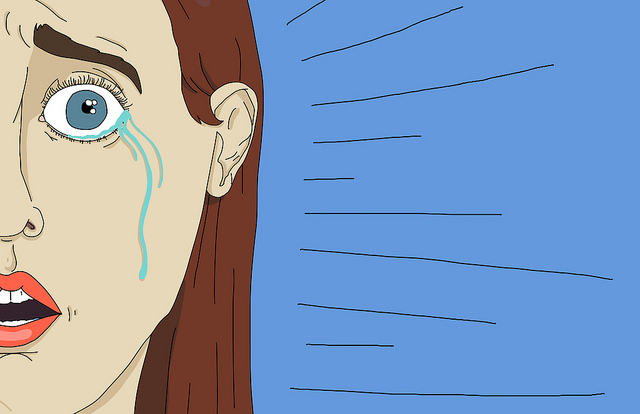Lately, I’ve been feeling higher than usual levels of crabbiness, anxiety, and malaise—probably because wonderful things are happening in my life.
And while I’m often reduced to levels of petulant weepiness that rival a toddler’s when life hands me something I’m not particularly fond of, this can also happen in the wake of occurrences that are undeniably and categorically awesome.
For instance: I’m writing this article on the same day we closed on our new house. Instead of partaking in jubilant merriment, I’m huddled away in the smallest room where we’ve temporarily set up camp (because all the other rooms feel too big and empty and scary right now), surrounded by an inflated air mattress with two bags of necessities, enough to last us a few days while we plot the big move.
And about five minutes ago, I was a truly a pathetic sight—crying into my pillow, trying to stave off feelings of impending doom.
It’s times like these when it’s helpful to remember something I tend to forget: wanted change is often just as difficult, demanding, and frightening as unwanted change.
At least with unwanted change—loss, failure, illness, global calamity—we’re given permission to be sad and freak out a little. But with happy changes, the kind we work hard and are congratulated for—marriage, the birth of a child, a new job, an exciting move—there is typically less space allowed for reactions and emotions that don’t fit the script.
But when I look back on the big life moments, the ones that marked some new level of transformation, expansion, and actualization—that walk through the doors on the first day of junior high, college, and graduate school, the signing of the marriage license, that step off the airplane into a country whose language I only sort of spoke—they were pretty much always accompanied by at least one oh-my-god-what-have-I-done moment.
Any change (especially the kind where we can’t imagine who we’ll be or what life will mean on the other side) puts stress on the system. It asks us to let go of what we know, float around for an indeterminate amount of time in a manic banana-swirl of chaos and uncertainty, and then trust that something coherent will coalesce out of the frenzied disarray.
First, there’s the challenge of the details—the seemingly unrelenting cascade of not-yet-done tasks and not-yet-made decisions that often accompany large and momentous transformation. Sometimes the walk toward the next right thing feels less like floating toward destiny and more like painstaking progression-by-checklist (or crying in the paint aisle of Home Depot, totally incapable of visually or intellectually processing the infinite array of paint chip options).
But more than that, big change not only alters life circumstances, it has a way of transforming the very fabric of our identities as we shape-shift to fit a new reality, hold a new responsibility, or enter a new life stage.
Now, there are many stories I could tell myself about what my hard emotions mean: that I’m bad, ungrateful, and whiny, that I made the wrong decision, that I should just pull it all together and suck it up. Or, I could just let myself be a human who sometimes has feelings about things.
Which is what I’m trying to do this time around. It’s easy to judge myself, especially when there are actual and legitimate things to be upset about—unhinged global leaders with access to nuclear weapons and white supremacy in Charlottesville (and everywhere, really).
But our emotions exist whether they make sense or not, and it is both possible and helpful to honor them in their weirdness, contradiction, and complexity, without making them the only real thing or making ourselves wrong for having them.
And the more I do this, the more space seems to be cleared for the new thing being born.
So now, when emotions come up that feel confusing or overwhelming, I try let them just be there. Because I know they don’t have to make rational sense. I don’t have to fix or even understand them. My only job to is to give them (and myself) some room to breathe. And if I can do this, I know that I’m at least sort of on the right track.
Author: Rachel Bruns
Image: Lookcatalog/Flickr
Editor: Emily Bartran
Copy Editor: Nicole Cameron
Social Editor: Leah Sugerman







Read 0 comments and reply